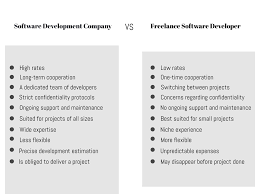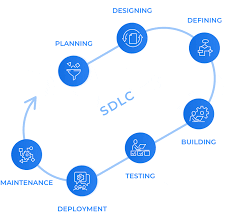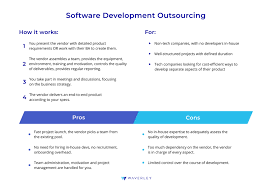Maximizing Efficiency: The Power of Outsourcing Development Services
The Benefits of Outsourcing Development Services
Outsourcing development services have become a popular trend in the business world, offering numerous benefits to companies looking to streamline their operations and reduce costs. Here are some key advantages of outsourcing development:
Cost-Effectiveness
One of the primary reasons companies choose to outsource development is cost-effectiveness. By outsourcing to countries with lower labor costs, businesses can save a significant amount of money on salaries and operational expenses.
Access to Specialized Skills
Outsourcing development allows companies to access a global talent pool with specialized skills that may not be available locally. This gives businesses the opportunity to work with experts in various technologies and domains, enhancing the quality of their projects.
Focus on Core Activities
By outsourcing non-core development tasks, companies can focus on their core activities and strategic initiatives. This helps improve productivity and efficiency within the organization, leading to better overall performance.
Faster Time-to-Market
Outsourcing development can help accelerate product development cycles and reduce time-to-market. With dedicated teams working on specific tasks, projects can be completed more quickly without compromising quality.
Risk Mitigation
Outsourcing development services can help mitigate risks associated with project delays, resource constraints, or skill gaps. By partnering with experienced outsourcing providers, companies can ensure smoother project execution and delivery.
Scalability and Flexibility
Outsourcing development offers scalability and flexibility to businesses, allowing them to easily adjust resources based on project requirements. This agility enables companies to respond quickly to changing market conditions and customer demands.
In conclusion, outsourcing development services provide a wide range of benefits that can help businesses achieve their goals more efficiently and effectively. By leveraging the expertise of external partners, companies can drive innovation, reduce costs, and gain a competitive edge in today’s dynamic business environment.
Top 7 FAQs About Outsource Development: Understanding Benefits, Risks, and Best Practices
- What is outsourcing development?
- Why do companies outsource development?
- What are the benefits of outsourcing development?
- How to choose the right outsourcing development partner?
- What are the risks associated with outsourcing development?
- How can companies ensure quality when outsourcing development?
- What are the key considerations before outsourcing development?
What is outsourcing development?
Outsourcing development refers to the practice of delegating software or application development tasks to external service providers or offshore teams. This approach allows companies to access specialized skills, reduce costs, and focus on their core business activities. By outsourcing development, organizations can benefit from a global talent pool, accelerate project timelines, and mitigate risks associated with resource constraints or skill gaps. Outsourcing development is a strategic decision that can help businesses optimize their operations and achieve greater efficiency in delivering high-quality products and services to their customers.
Why do companies outsource development?
Companies outsource development for a variety of reasons, including cost-effectiveness, access to specialized skills, increased focus on core activities, faster time-to-market, risk mitigation, and scalability. By outsourcing development tasks to external partners or offshore teams, companies can benefit from lower labor costs, tap into a global talent pool of experts in various technologies, free up internal resources to concentrate on strategic initiatives, accelerate product development cycles, reduce project risks, and easily adjust resources based on project requirements. Overall, outsourcing development enables companies to improve efficiency, drive innovation, and gain a competitive edge in today’s fast-paced business landscape.
What are the benefits of outsourcing development?
Outsourcing development offers a myriad of benefits to businesses seeking to enhance their operations and drive growth. By outsourcing development tasks, companies can tap into a global talent pool with specialized skills, gaining access to expertise that may not be readily available in-house. This approach not only improves the quality of projects but also allows organizations to focus on their core activities and strategic initiatives. Additionally, outsourcing development can lead to cost savings, faster time-to-market, risk mitigation, scalability, and flexibility, ultimately helping businesses stay competitive in a rapidly evolving market landscape.
How to choose the right outsourcing development partner?
When selecting the right outsourcing development partner, it is crucial to consider several key factors to ensure a successful collaboration. First and foremost, evaluate the partner’s expertise and experience in your specific industry and technology requirements. Look for a partner with a proven track record of delivering high-quality projects within budget and timelines. Additionally, assess their communication skills, cultural fit, and willingness to understand your business goals. Transparency, flexibility, and a robust project management process are also essential criteria to consider when choosing the ideal outsourcing development partner. By thoroughly assessing these aspects, you can select a reliable partner that aligns with your objectives and contributes to the success of your projects.
What are the risks associated with outsourcing development?
When considering outsourcing development, it is important to be aware of the potential risks involved. Some common risks associated with outsourcing development include communication challenges due to language barriers or time zone differences, quality control issues that may arise when working with external teams, data security concerns related to sharing sensitive information with third-party providers, and the risk of project delays or unexpected costs. It is essential for companies to carefully evaluate these risks and implement strategies to mitigate them effectively in order to ensure successful outcomes when outsourcing development services.
How can companies ensure quality when outsourcing development?
When companies choose to outsource development, ensuring quality is a top priority. To maintain high standards, businesses can take several steps. First, it is essential to thoroughly vet potential outsourcing partners by reviewing their portfolios, client testimonials, and industry reputation. Establishing clear communication channels and project requirements from the outset is crucial for alignment on expectations. Implementing regular progress reviews, quality checks, and milestone evaluations can help monitor the project’s trajectory and address any issues promptly. Additionally, defining key performance indicators (KPIs) and service level agreements (SLAs) can provide a measurable framework for evaluating the outsourced team’s performance against predefined benchmarks. By fostering transparency, collaboration, and accountability throughout the outsourcing process, companies can uphold quality standards and ensure successful project outcomes.
What are the key considerations before outsourcing development?
Before outsourcing development, there are several key considerations that businesses should take into account to ensure a successful partnership. Firstly, it is essential to clearly define project requirements and objectives to communicate expectations effectively with the outsourcing provider. Understanding the scope of work, timelines, and budget constraints is crucial for a smooth collaboration. Additionally, evaluating the expertise and experience of potential outsourcing partners, as well as their track record in similar projects, can help in selecting the right fit for the job. Establishing clear communication channels, defining roles and responsibilities, and addressing potential risks upfront are also important considerations to mitigate challenges during the outsourcing process. By carefully assessing these factors before outsourcing development, companies can set the foundation for a productive and fruitful partnership that delivers desired outcomes.









